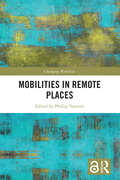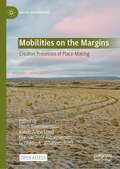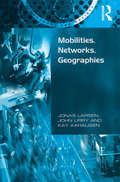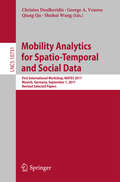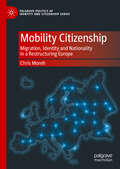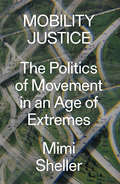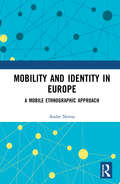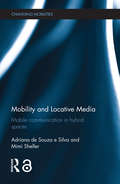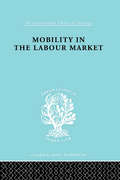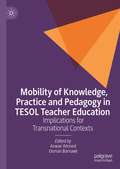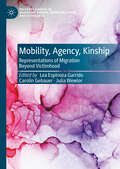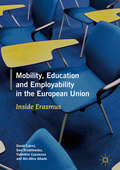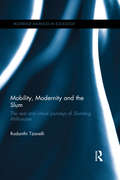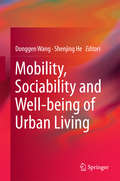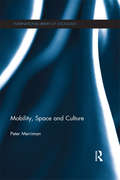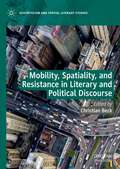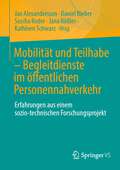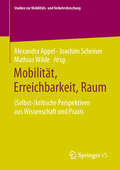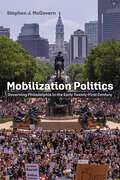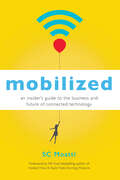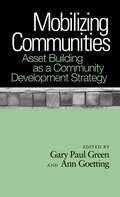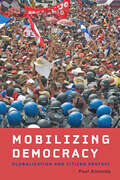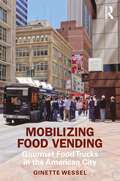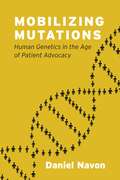- Table View
- List View
Mobilities in Remote Places (Changing Mobilities)
by Phillip VanniniMobilities in Remote Places explores the meanings, challenges, and opportunities of remoteness as practiced and experienced by those who live and work in some of the world’s most remote communities. As mobilities around the world proliferate in countless forms, the meanings of remoteness undergo significant change. Places once considered impossibly distant have appeared to become closer, more accessible, and less distinct from global centres of geopolitical power. But instead of disappearing altogether, configurations of remoteness evolve, manifesting themselves through new possibilities, new challenges, and new insecurities. Drawing from a variety of case studies from around the globe, the book’s contributors examine remoteness as an outcome of evolving mobility constellations. Rather that defining remoteness as an absolute or objective time-distance condition, the book shows how remoteness is a practice, experience, and representation that is situated, relational, and emergent. This collection of original and thought-provoking chapters will be of interest to students and researchers in the humanities and social sciences with an interest in mobilities, place, and human geography.
Mobilities in Remote Places (Changing Mobilities)
by Phillip VanniniMobilities in Remote Places explores the meanings, challenges, and opportunities of remoteness as practiced and experienced by those who live and work in some of the world’s most remote communities.As mobilities around the world proliferate in countless forms, the meanings of remoteness undergo significant change. Places once considered impossibly distant have appeared to become closer, more accessible, and less distinct from global centers of geopolitical power. But instead of disappearing altogether, configurations of remoteness evolve, manifesting themselves through new possibilities, new challenges, and new insecurities. Drawing from a variety of case studies from around the globe, the contributors of the book examine remoteness as an outcome of evolving mobility constellations. Rather than defining remoteness as an absolute or objective time–distance condition, the book shows how remoteness is a practice, experience, and representation that is situated, relational, and emergent.This collection of original and thought-provoking chapters will be of interest to students and researchers in the humanities and social sciences with an interest in mobilities, place, and human geography.
Mobilities on the Margins: Creative Processes of Place-Making (Arctic Encounters)
by Katrín Anna Lund Gunnar Thór Jóhannesson Björn Thorsteinsson Guðbjörg R. JóhannesdóttirThis open access book examines places on the margins and the dynamics through which a marginal position of a place is created. Specifically, it explores how places, mostly in sparsely populated areas, often perceived as immobile and frozen in time, come into being and develop through interference of everyday mobilities and creative practices that cut across the spheres of culture and nature as usually defined. Through fieldwork and case studies from areas in Iceland, Finland, Greenland, and Scotland, the book’s twelve chapters draw out the multiple relations through which places emerge, where people compose their lives as best they can with their surroundings. A special concern is to explore the links between travelling, landscape, and material culture and how places and margins are enacted through mobilities and creative practices of humans and other beings. The emphasis on mobility disturbs the perception of a place as a bounded entity and offers a useful and necessary understanding of places as mobile and fluid. Mobilities on the Margins is a novel and timely contribution to the exploration of human and more-than-human interactions in a world of increasingly fluid mobilities and insistent crises.
Mobilities, Networks, Geographies
by John Urry Jonas LarsenThere have been striking increases in both long-distance travel and in communications through mobile phones, text messaging, emailing and videoconferencing. Such developments in communication, along with a similar increase in physical travel and movement of goods around the globe, reconfigure social networks by disconnecting and reconnecting people in new ways. This original book puts forward one of the first social science studies of the geographies of social networks and related mobilities of travel, communications and face-to-face meetings. The book examines five interdependent mobilities that form and reform these geographies of networks and travel in the contemporary world. These are: physical travel of people for work, leisure, pleasure, migration and escape; physical movement of objects delivered to producers, consumers and retailers; imaginative travel elsewhere through images and memories seen on texts, TV, computer screens and film; virtual travel on the internet; and communicative travel through letters, cards, telegrams, telephones, faxes, text messages and videoconferences. In the book the authors examine the interconnections between these different mobilities. They research how travel and social meetings require systems of coordination using virtual and communicative travel in-between physical travel and meetings. They argue that, while it might be imagined that there would be less need of physical meetings with improved technology, on the contrary, scheduled visits and meetings have become highly significant. The research shows that they are necessary to social life in the contemporary world, both within business and, especially, within families and friendships which are increasingly conducted at a distance.
Mobility Analytics for Spatio-Temporal and Social Data: First International Workshop, MATES 2017, Munich, Germany, September 1, 2017, Revised Selected Papers (Lecture Notes in Computer Science #10731)
by Christos Doulkeridis George A. Vouros Qiang Qu Shuhui WangThis book constitutes the refereed post-conference proceedings of the First International Workshop on Mobility Analytics for Spatio-Temporal and Social Data, MATES 2017, held in Munich, Germany, in September 2017. The 6 revised full papers and 2 short papers included in this volume were carefully reviewed and selected from 13 submissions. Also included are two keynote speeches. The papers intend to raise awareness of real-world problems in critical domains which require novel data management solutions. They are organized in two thematic sections: social network analytics and applications, and spatio-temporal mobility analytics.
Mobility Citizenship: Migration, Identity and Nationality in a Restructuring Europe (Palgrave Politics of Identity and Citizenship Series)
by Chris MorehThis book aims to trace the development of a new conception of ‘mobility citizenship’ in Europe historically, demographically and experientially. To this aim, it adopts a ‘constellationist’ approach applied to the intra-European mobility space and uses the case studies of Hungarian and Romanian migration to the United Kingdom to develop a multidimensional meso-level comparative empirical analysis of mobility-citizenship constellations. The main theoretical proposition of the book is that citizenship has undergone a noticeable change in meaning and valuation, with mobility rights becoming a more central component in the structure of opportunities it provides citizens. The logic of ‘mobility citizenship’ is thus changing long-held perceptions around the social functions of citizenship, and consequently, the nature of contemporary transnational society. The multifaceted analysis presented in the book will appeal to readers with backgrounds in various disciplines such as political sociology, migration studies, citizenship studies, nationalism studies, or European studies.
Mobility Justice: The Politics of Movement in an Age of Extremes
by Mimi ShellerMobility justice is one of the crucial political and ethical issues of our dayWe are in the midst of a global climate crisis and experiencing the extreme challenges of urbanization. In Mobility Justice, Mimi Sheller makes a passionate argument for a new understanding of the contemporary crisis of movement.Sheller shows how power and inequality inform the governance and control of movement. She connects the body, street, city, nation, and planet in one overarching theory of the modern, perpetually shifting world. Concepts of mobility are examined on a local level in the circulation of people, resources, and information, as well as on an urban scale, with questions of public transport and “the right to the city.” On the planetary level, she demands that we rethink the reality where tourists and other elites are able to roam freely, while migrants and those most in need are abandoned and imprisoned at the borders.Mobility Justice is a new way to understand the deep flows of inequality and uneven accessibility in a world in which the mobility commons have been enclosed. It is a call for a new understanding of the politics of movement and a demand for justice for all.
Mobility and Identity in Europe: A Mobile Ethnographic Approach
by Andre NovoaThis book demonstrates that mobility in Europe is not a synonym for European mobility, showing how certain mobile individuals are more likely to develop an explicitly European identity than others. Through a series of mobile ethnographic accounts with truck drivers, musicians and MEPs, the author lays out the complexities behind assumptions about mobility and European identity, providing a clear contrast between individuals for whom this process certainly is true and others who, in spite of their high levels of mobility, do not consider themselves European, or for whom the notion of being European is simply insignificant. Ultimately, as this book shows, the enactment of a European identity, through practices of mobility, has more to do with social class than with a mobile condition per se, with mobility in Europe being transformed into European mobility only when it empowers individuals, solidifying their elevated position in the social pyramid. An account of European identity and its connection to mobility and notions of class, Mobility and Identity in Europe also explores the ways in which mobile ethnography can be practised as a method and what conclusions can be drawn from it. As such, it will appeal to scholars and students of sociology, anthropology and geography.
Mobility and Locative Media: Mobile Communication in Hybrid Spaces (Changing Mobilities)
by Mimi Sheller Adriana de Souza e SilvaMobilities has become an important framework to understand and analyze contemporary social, spatial, economic and political practices. Especially as mobile media become seamlessly integrated into transportation networks, navigating urban spaces, and connecting with social networks while on the move, researchers need new approaches and methods to bring together mobilities with mobile communication and locative media. Mobile communication scholars have focused on cell phones, often ignoring broader connections to urban spaces, geography, and locational media. As a result, they emphasized virtual mobility and personalized communication as a way of disconnecting from place, location and publics. The growing pervasiveness of location-aware technology urges us to rethink the intersection among location, mobile technologies and mobility. Few studies have addressed the many transformations taking place in mobile sociality and in urban spatial processes through the appropriation of these technologies. Chapter 12 of this book is freely available as a downloadable Open Access PDF under a Creative Commons Attribution-Non Commercial-No Derivatives 3.0 license. https://s3-us-west-2.amazonaws.com/tandfbis/rt-files/docs/Open+Access+Chapters/9781138778139_oachapter12.pdf
Mobility in the Labour Market: Employment Changes in Battersea and Dagenham (International Library of Sociology)
by Margaret JefferysFirst published in 1998. Routledge is an imprint of Taylor & Francis, an informa company.
Mobility of Knowledge, Practice and Pedagogy in TESOL Teacher Education: Implications for Transnational Contexts
by Anwar Ahmed Osman BarnawiThis edited book brings together chapters from diverse geographical and educational contexts to examine the question of transnationalism in English Language teacher education. While the activities that connect people, institutions and cultural practices across the borders of nation-states have gained interest in fields such as applied linguistics, TESOL and migration studies in recent years, there has been little research so far into how transnationalism intersects with language teacher education, and how existing practices can be better integrated into teacher education programmes. The authors fill this gap by introducing and examining existing transnational practices - including cross-cultural settings, study abroad programmes and online teacher education - then offering multiple dialogues on mobility of knowledge, practice and pedagogy in teacher education. This book will be of interest to language teachers, teacher educators, and students and scholars of applied linguistics, cross-cultural studies, and migration studies.
Mobility, Agency, Kinship: Representations of Migration Beyond Victimhood (Palgrave Studies in Mediating Kinship, Representation, and Difference)
by Lea Espinoza Garrido Carolin Gebauer Julia WewiorThis volume offers new perspectives on the ways in which migrants use storytelling practices and kinship formations in order to navigate and modify spaces of sovereignty, and thus to re-write narratives portraying them as helpless and passive victims. It provides one of the first investigations that assembles multidisciplinary contributions to look beyond individual acts of migrant agency and toward the entanglements of individual and collective agency, formations of kinship structures, and feelings, expressions, and representations of community and (multiple) belonging(s). The contributions explore the interplay between agency, kinship, and migration from various fields, including sociology, psychology, philosophy, border studies, gender and queer studies, postcolonial studies, ecocriticism, film and media studies, and literary and cultural studies – with a special focus on interdisciplinary narrative theory. They address real and imagined assertions of migrant agency and kinship formations; draw on empirical research, interviews, and accounts of lived experiences; and analyze the role of narrative, media, and technologies in artistic, literary, and cinematic representations of migrant agency and kinship. By probing migrant identity discourses in different cultural and medial contexts, the contributions examine how narratives negotiate and challenge the unequal distribution of mobility, resources, and vulnerability that preconfigures many migrant lives; they also discuss narrative devices, storytelling techniques, and other representational strategies that migrants employ, as well as technologies that they draw on, to lay powerful claims on space and citizenship and to eschew established scripts of victimhood. As such, the volume addresses and embraces the tensions between vulnerability and agency that come to the fore when we try to understand the different ways in which migrants shape, and are shaped by, their (trans)local, material, economic, affective, social, cultural, and political realities.
Mobility, Education and Employability in the European Union: Inside Erasmus
by David Cairns Valentina Cuzzocrea Ewa Krzaklewska Airi-Alina AllasteThis book takes an in-depth look at the European Commission’s Erasmus programme. In its current Erasmus+ format, the programme supports international exchange visits among students, trainees, volunteers and academic members of staff with a view to enhancing employability and encouraging intercultural understanding. Against the backdrop of the 30th anniversary of Erasmus, the authors explore the successes of the programme, most prominently the undergraduate exchange programme, as well as areas of on-going development, including the incorporation of short duration mobility projects focused on specific social issues into the initiative.Through integrating perspectives from authors in a number of European countries, all of whom have knowledge regarding various aspects of Erasmus, the book provides insight into the challenges facing the programme as it moves into its fourth decade. Mobility, Education and Employability in the European Union: Inside Erasmus will be of interest to students and scholars from a range of disciplines, including geography, sociology and European politics.
Mobility, Modernity and the Slum: The Real and Virtual Journeys of 'Slumdog Millionaire' (Routledge Advances in Sociology)
by Rodanthi TzanelliOnly virtuous humans are supposed to move in time to meet their happy destiny or karma. The tale of Jamal in Slumdog Millionaire is such a case of serendipitous mobility towards riches and love – a ‘journey’ in which good heroes and urban communities respecting solidarity are successfully modernised. Unsurprisingly, the film became tangled in many controversies around India’s destiny in the world: the film inserted Mumbai into various financial, political and artistic scenes, increased tourism in its filmed slums, and brought about charity projects in which celebrities and tourist businesses were involved. Slumdog Millionaire served as a global example of a ‘developing country’s’ uneven but unique modernisation. This book examines such mobilities of ideas, art, tourism and activism together. In doing so, it reveals the significance of Mumbai as a post-colonial city in discussions of modernity – a form of mobile adaptation to new world realities. Tzanelli examines the various agents involved in controversies through multiple virtual and real journeys to India’s colonial history and present social complexity, with a view to actualise a post-colonial future, a ‘destiny’ as the country’s serendipitous destination. Addressed to interdisciplinary audiences, the book will be a useful text for students and scholars of globalisation, mobility, tourism, media and social movement theory.
Mobility, Sociability and Well-being of Urban Living
by Donggen Wang Shenjing HeThis book investigates critical urban issues related to socio-spatial segregation, housing, daily travel, mobility of the elderly, etc. from the perspective of wellbeing. This is a collection of the latest research works by frontline researchers working in the fields of geography, urban studies, transport, and sociology. Drawing on theoretical and empirical explorations, collected chapters in this book connect mobility and wellbeing, bridge geography and health, and analyze the implications of mobility disadvantages on urban marginal groups' wellbeing. Research findings presented in the book are also highly relevant for practitioners and policy makers in the pursuit of improving urban livability since wellbeing, or quality of life, is increasingly considered as an important criteria alternative to income growth to evaluate economic, social and urban development.
Mobility, Space and Culture (International Library of Sociology)
by Peter MerrimanOver the past ten to fifteen years there has emerged an increasing concern with mobility in the social sciences and humanities. In Mobility, Space and Culture, Peter Merriman provides an important and timely contribution to the mobilities turn in the social sciences, encouraging academics to rethink the relationship between movement, embodied practices, space and place. The book takes an interdisciplinary approach, drawing upon theoretical and empirical work from across the social sciences and humanities to provide a critical evaluation of the relationship between 'mobility' and 'place'/'site', reformulating places as in process, open, and dynamic spatial formations. Merriman draws upon post-structuralist writings on space, practice and society to demonstrate how movement is not simply practised or experienced in relation to space and time, but gives rise to rhythms, forces, atmospheres, affects and materialities which are often more crucial to embodied apprehensions of events than sensibilities of spatiality and temporality. He draws upon detailed empirical research on experiences of, and social reactions to, driving in late Victorian and Edwardian Britain to trace how the motor-car became associated with sensations of movement-space and enmeshed with debates about embodiment, health, visuality, gender and politics. The book will be essential reading for undergraduates and postgraduates studying mobility in sociology, geography, cultural studies, politics, transport studies, and history.
Mobility, Spatiality, and Resistance in Literary and Political Discourse (Geocriticism and Spatial Literary Studies)
by Christian BeckMobility, Space, and Resistance: Transformative Spatiality in Literary and Political Discourse draws from various disciplines—such as geography, sociology, political science, gender studies, and poststructuralist thought—to posit the productive capabilities of literature in political action and at the same time show how literary art can resist the imposition and domination of oppressive systems of our spatial lives. The various approaches, topics, and types of literature discussed in this volume display a concern for social issues that can be addressed in and through literature. The essays address social injustice, oppression, discrimination, and their spatial representations. While offering interpretations of literature, this collection seeks to show how literary spaces contribute to understanding, changing, or challenging physical spaces of our lived world.
Mobilität und Teilhabe – Begleitdienste im öffentlichen Personennahverkehr: Erfahrungen aus einem sozio-technischen Forschungsprojekt
by Daniel Bieber Sascha Roder Jan Alexandersson Jana Rößler Kathleen SchwarzDas Mobilitätsprojekt „mobisaar“ verbessert die Teilhabe von mobilitätseingeschränkten Menschen und Menschen mit Behinderungen durch den Einsatz von Lots*innen und mit Technikunterstützung durch Apps. Das in vier saarländischen Landkreisen erfolgreich umgesetzte BMBF-Projekt wird nach 5 Jahren Laufzeit 2020 finalisiert und bietet einen guten Einblick in die Konzepte, Strukturen und Schulungsideen des kostenfreien Begleitdienstes im kleinsten Flächenland Deutschlands sowie dessen Auswirkungen auf den ÖPNV.
Mobilität, Erreichbarkeit, Raum: (Selbst-)kritische Perspektiven aus Wissenschaft und Praxis (Studien zur Mobilitäts- und Verkehrsforschung)
by Joachim Scheiner Mathias Wilde Alexandra AppelDer Sammelband fasst wichtige Themen und Entwicklungen der Mobilitäts- und Verkehrsforschung der letzten Jahre zusammen. Die Beiträge gehen auf das Instrumentarium empirischer Forschung ein und erläutern deren Einsatzbereiche anhand konkreter Anwendungsfälle. Genauso zeigt der Sammelband jene Perspektiven auf, mit denen die Planungspraxis der (Um-)Gestaltung der Verkehrssysteme eine Form geben kann, um nachhaltigere Mobilität zu fördern. Damit richtet er sich sowohl an eine Leserschaft, die sich mit den wissenschaftlichen Grundlagen der Mobilitäts- und Verkehrsforschung befasst, als auch an eine Leserschaft, die an wissenschaftlich fundierten Maßnahmen zur nachhaltigen Umgestaltung der Verkehrssysteme interessiert ist.
Mobilization Politics: Governing Philadelphia in the Early Twenty-First Century
by Stephen J. McGovernHow grassroots activism transforms contemporary urban politics in Philadelphia and beyondImmigration, gentrification, and the rise of an innovation-based economy are altering American cities. In Mobilization Politics, Stephen J. McGovern offers a new approach to analyzing contemporary urban politics in light of these broad, societal changes. Redirecting the focus from the top-down orientation of regime theory toward a more bottom-up perspective, he contends that a striking upsurge in grassroots activism around issues such as policing and criminal justice reform, precarious labor, affordable housing, community development, and workforce diversity is transforming urban politics and policymaking.Through a detailed analysis of political activity in Philadelphia over the past decade, McGovern elucidates the mechanisms and impacts of grassroots mobilization. Philadelphia is typical of many large American cities with a relatively prosperous downtown core surrounded by neighborhoods that continue to struggle, sometimes amidst grinding poverty and long-standing racial oppression. And yet, Philadelphia, as a site of substantial grassroots activism since the early 2010s, has made significant strides in combatting economic and racial inequality in several important policy realms.Mobilization Politics expands the scope of the field of urban politics beyond the quiet, behind-the-scenes bargaining of regime partners and considers other key arenas of political contestation—such as electoral politics; policymaking by the mayor, administrative agencies, and the city council; and a wide range of activist groups operating at the grassroots. The book shows how bottom-up mobilization has been especially effective when activists engaging in street protests and demonstrations have joined with more established community-based organizations and issue-advocacy groups skilled in lobbying, litigation, and electioneering. By highlighting how this combination of insider/outsider activism has been a potent force for political change in contemporary Philadelphia, Mobilization Politics presents a more comprehensive, dynamic, and revealing way to look at power and politics in American cities today.
Mobilized: An Insider’s Guide to the Business and Future of Connected Technology
by SC MoattiMobile has now become such an integral part of how we live that, for many people, losing a cell phone is like losing a limb. Everybody knows mobile is the future, and every business wants in, but what are the elements of mobile success? SC Moatti, a Silicon Valley veteran who was an executive with Facebook, Trulia, and Nokia, gives businesses and professionals simple ways to thrive in this modern day "gold rush." More than a book on technology, this is a book about human nature and what matters most to us. Moatti shows that because mobile products have become extensions of ourselves, we expect from them what we wish for ourselves: an attractive body, a meaningful life, and a growing repertoire of skills. She has created an all-encompassing formula that makes it easy for any business to develop a strategy for creating winning mobile products.Her Body Rule dictates that mobile products must appeal to our sense of beauty—but beauty in a mobile world is both similar to and different from what it means offline. The Spirit Rule says mobile products must help us address our deepest personal needs. And the Mind Rule explains that businesses that want to succeed in mobile need to continually analyze the user experience so they can improve every iteration of their products. Moatti includes case studies from mobile pioneers such as Facebook, Uber, Tinder, WhatsApp, and more. The market is full of how-to books for programming apps, but no works examine what is required for success in the mobile era. Until now.
Mobilizing Communities: Asset Building as a Community Development Strategy
by Ann Green Gary Paul GoettingAs communities face new social and economic challenges as well as political changes, the responsibilities for social services, housing needs, and welfare programs are being placed at the local government level. But can community-based organizations address these concerns effectively? The editors and contributors toMobilizing Communitiesexplore how these organizations are responding to these challenges, and how asset-based development efforts can be successful. Asset-based development, rather than needs assessment, has become a new paradigm in the community development field over the last fifteen years. Although the approach is widely used by practitioners and promoted by foundations, asset-based development has not been examined critically by researchers until now. Mobilizing Communitiesprovides a conceptual framework and practical guidance to community development practitioners. The editors solicited case studies from a variety of geographic settings, regions and racial/ethnic groups. The communities in the case studies mobilize residents around different forms of community capital (e. g. , financial, cultural, and environmental capital). The contributors examine the role of public participation, the organizational and institutional structure, relationships with governmental officials, and the outcomes and impacts of the asset-based development projects. Contributors include: Lionel J. "Bo" Beaulieu, Sarah Dewees, Michael L. Dougherty, Mark H. Harvey, John (Jody) Kretzmann, Rocío Peralta, Rhonda Phillips, Deborah Puntenney, Stewart Sarkozy-Banoczy, Gordon E. Shockley, and the editors
Mobilizing Democracy: Globalization and Citizen Protest (Themes in Global Social Change)
by Paul AlmeidaWhat are the conditions and factors that drive people to protest against government economic policies in the developing world?Distinguished Scholarship Award of the Pacific Sociological Association (2015)Paul Almeida’s comparative study of the largest social movement campaigns that existed between 1980 and 2013 in every Central American country (Costa Rica, El Salvador, Guatemala, Honduras, Nicaragua, and Panama) provides a granular examination of the forces that spark mass mobilizations against state economic policy, whether those factors are electricity rate hikes or water and health care privatization. Many scholars have explained connections between global economic changes and local economic conditions, but most of the research has remained at the macro level. Mobilizing Democracy contributes to our knowledge about the protest groups "on the ground" and what makes some localities successful at mobilizing and others less successful. His work enhances our understanding of what ingredients contribute to effective protest movements as well as how multiple protagonists—labor unions, students, teachers, indigenous groups, nongovernmental organizations, women’s groups, environmental organizations, and oppositional political parties—coalesce to make protest more likely to win major concessions.Based on extensive field research, archival data of thousands of protest events, and interviews with dozens of Central American activists, Mobilizing Democracy brings the international consequences of privatization, trade liberalization, and welfare-state downsizing in the global South into focus and shows how persistent activism and network building are reactivated in these social movements. Almeida enables our comprehension of global and local politics and policy by answering the question, "If all politics is local, then how do the politics of globalization manifest themselves?" Detailed graphs and maps provide a synthesis of the quantitative and qualitative data in this important study. Written in clear, accessible prose, this book will be invaluable for students and scholars in the fields of political science, social movements, anthropology, Latin American studies, and labor studies.
Mobilizing Food Vending: Gourmet Food Trucks in the American City
by Ginette WesselMobilizing Food Vending investigates the gourmet food truck movement in the United States and provides a clearer understanding of the social and economic factors that shape vendor autonomy and industry growth. The book features case studies in a variety of American cities and uses top-down and bottom-up urban theory to frame a discussion of food trucks’ rights, displacement, and resiliency. Using ethnographic and archival research collected from industry experts, the book examines vendors’ operational strategies, their regulatory challenges when navigating the city, and their economic, cultural, and political roles in shaping urban space. Mobilizing Food Vending argues that food truck vendors are critical actors that support local economies and contribute to the public realm while shaping regulatory policy from the bottom up. This book will appeal to urban scholars studying the contemporary neoliberal city, the public realm, and communication technology and mobility, as well as to urban planners seeking to understand how vendors shape city plans and policies.
Mobilizing Mutations: Human Genetics in the Age of Patient Advocacy
by Daniel NavonWith every passing year, more and more people learn that they or their young or unborn children carries a genetic mutation. But what does this mean for the way we understand a person? Today, genetic mutations are being used to diagnose novel conditions like the XYY, Fragile X, NGLY1 mutation, and 22q11.2 Deletion syndromes, carving out rich new categories of human disease and difference. Daniel Navon calls this form of categorization “genomic designation,” and in Mobilizing Mutations he shows how mutations, and the social factors that surround them, are reshaping human classification. Drawing on a wealth of fieldwork and historical material, Navon presents a sociological account of the ways genetic mutations have been mobilized and transformed in the sixty years since it became possible to see abnormal human genomes, providing a new vista onto the myriad ways contemporary genetic testing can transform people’s lives. Taking us inside these shifting worlds of research and advocacy over the last half century, Navon reveals the ways in which knowledge about genetic mutations can redefine what it means to be ill, different, and ultimately, human.
